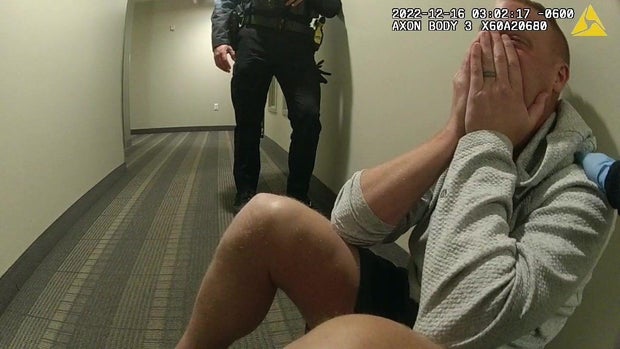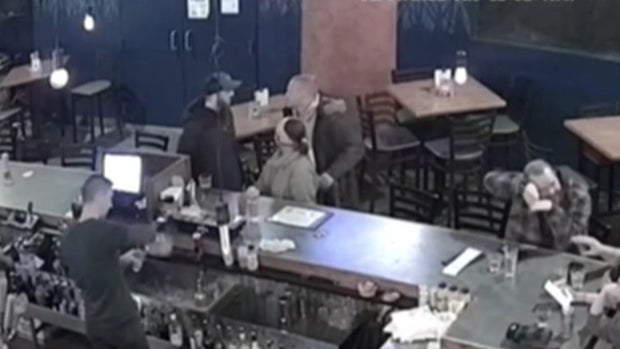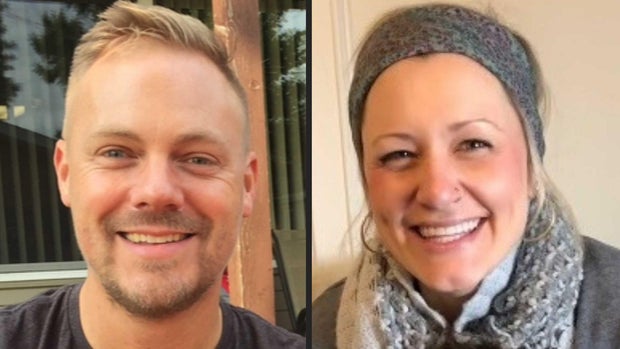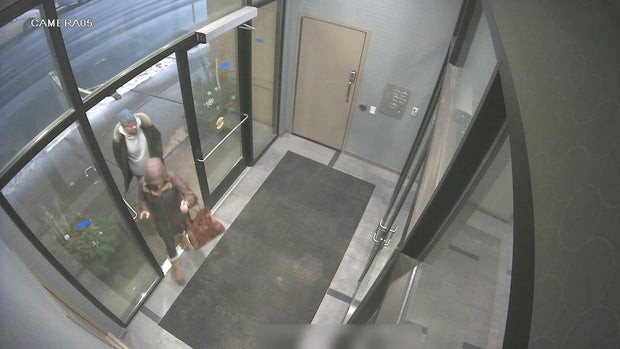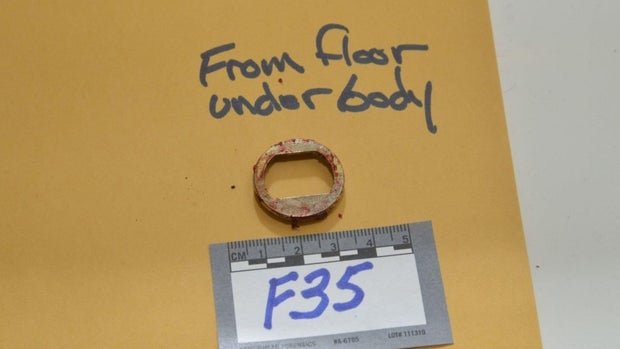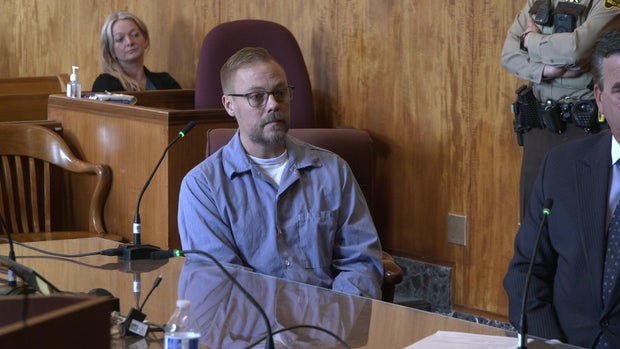CBS News
A Minnesota woman is fatally shot in her bathroom. Who pulled the trigger?

It was a week before Christmas in 2022, when Saint Paul, Minnesota, police officer Ching Vang and his partner Officer Justina Hser set off on their regular patrol of the city.
Natalie Morales | “48 Hours” contributor: The overnight hours, it’s December 16th, 2022. What time do you get that call?
Officer Ching Vang: On that night, the call came in around 2:50.
Officer Ching Vang: … dispatcher stated that a female was shot in the head. … my partner and I, we went lights and sirens heading towards that call.
Natalie Morales: And is it … all units in the vicinity called in at that time?
Officer Ching Vang: Yes. … pretty much, every unit hop on that call to come and assist.
Within minutes Vang, Hser, and several other officers — body cameras rolling — arrived at the location, a residential apartment building. Matthew Ecker, the man who had placed the 911 call, let them in and directed them to an apartment on the second floor.
Vang was the first to enter the apartment.
Officer Ching Vang: I remember walking in, the bathroom was to the right, the very first door.
ALEX PENNIG’S DEATH INVESTIGATION BEGINS
Alex Pennig, 32, was lying face up with a single gunshot wound to her left temple.
Officer Ching Vang: I noticed … a lot of blood around her head.
Vang had immediately spotted the gun laying on Alex’s left shoulder; her hand resting on top. A team of officers looked around the small studio apartment and questioned neighbors. No one had heard anything.
In the hallway, Hser was talking to Ecker.
OFFICER HSER (police bodycam): (to Ecker) You got to keep breathing. You got to keep breathing.
Officer Justina Hser: He was … on the floor by himself. So, I just went and approached him and just started talking to him.
Ramsey County District Court
MATTHEW ECKER (police bodycam): Oh God, why’d she do that? (sobbing)
Natalie Morales: Were you concerned about him?
Officer Justina Hser: I was. … because at the time we didn’t know what was going on …
OFFICER HSER (police bodycam): I know it’s shocked. I know it’s hard.
Officer Justina Hser: I just told him to just slow down. Take your time. We’re not in a rush, whenever you’re ready, I’m — I’m ready to listen.
Ecker did eventually calm down and he started talking —
OFFICER HSER (police bodycam): Were you guys arguing or something?
MATTHEW ECKER: No.
— telling officers he lived almost three hours away but drove to Alex after she placed a frantic call to him earlier.
MATTHEW ECKER (police bodycam) So I came here to help her feel safe.
Ecker told police Alex had gotten into a fight with her current boyfriend. His name was Shane Anderson — that things had gotten physical, and she was scared of what he might do. So, Ecker took his gun and brought it with him to Alex’s apartment.
MATTHEW ECKER (police bodycam): …because I was worried that her boyfriend would come …
Natalie Morales: So, he was going there, he said, to protect her?
Officer Justina Hser: Yes.
Ecker arrived at Alex’s around 2 p.m. Anderson wasn’t there.
MATTHEW ECKER (police bodycam): You know we were just hanging out.
That evening, he said, they went out to local bars. When they walked into a place called Camp Bar, Anderson was inside.
MATTHEW ECKER (police bodycam): He came to her, they were arguing, and I came across and I stood in between them and then he punched me.
Anderson hit him, he says, and then was kicked out of the bar.
MATTHEW ECKER (police bodycam): … and then her and I sat there and talked with other people for another 45 minutes. We came back here, and I thought everything was fine. And then she just grabbed the gun.
OFFICER HSER: Did she make any threat, before that —
MATTHEW ECKER: Not —
OFFICER HSER: — that she was going to kill herself?
MATTHEW ECKER: I didn’t —
OFFICER HSER: Or hurt herself?
MATTHEW ECKER: She just grabbed it and put it to her head.
And with the gun in her hand, she backed into the bathroom, he says, and locked the door. Moments later a single shot rang out. Ecker says he quickly broke the door open and saw Alex on the floor. He told the officers he tried using his nursing skills to stop the bleeding by putting pressure on the wound.
MATTHEW ECKER (police bodycam): … I tried to do what I could.
OFFICER HSER: OK.
MATTHEW ECKER: And then I washed my hands.
OFFICER HSER: Then you washed your hands?
MATTHEW ECKER: Correct. That’s why I don’t have anything on my hands.
OFFICER HSER: And then you, then you called the police?
MATTHEW ECKER: Yeah.
The news that Alex had fired a gun — taking her own life — was unfathomable to Alex’s parents Mary Jo and Jim Pennig.
Mary Jo Pennig: That just was completely out of character for Alex.
Jim Pennig: She had never shot a gun. … Didn’t like guns … so it didn’t make any sense.
Gillian Kubitschek
And Alex’s mom Mary Jo Pennig had just texted with her daughter a few hours earlier and she didn’t seem depressed at all.
Mary Jo Pennig: She was doing well … you know and that’s what’s hard.
Detectives Abby DeSanto and Jennifer O’Donnell were called to the scene.
Det. Jennifer O’Donnell: You get a call in the middle of the night, so you know it’s not good.
Inside the apartment there was alcohol and six bottles of prescription medications, including antidepressants and amphetamines, all prescribed to Alex. But if that suggested maybe Alex had been depressed and took her own life, there were other things that didn’t seem to add up in Ecker’s account. The first was the position of Alex’s body, say the investigators.
CBS News
Det. Jennifer O’Donnell: The door to the bathroom was ajar and you immediately see Alex’s feet on either side of the door.
If Ecker had broken down the bathroom door after hearing the gunshot — as he told officers he had —
CBS News
Det. Jennifer O’Donnell: We think that if that had been the case … her legs, would’ve been swept behind the door.
And even though Ecker had said he washed his hands before calling 911 —
Det. Abby DeSanto: When responding officers arrived the sink was dry. … and if, he had said, you know, he called the police right away that sink probably would’ve been still wet …
The detectives decided to take a deeper look at Ecker’s story. He had told police his only mission that day was to protect Alex from Shane Anderson, the boyfriend he claimed was violent. And in fact, there were these holes in the closet door — holes Ecker said Shane was responsible for.
Det. Abby DeSanto: — across from the bathroom, kinda like punch marks.
The detectives were now eager to speak with Anderson.
A PUNCH CAUGHT ON TAPE
Hours after Alex Pennig was found dead, police were at her boyfriend Shane Anderson’s front door.
OFFICER (police bodycam): Hey, it’s Saint Paul Police.
OFFICER: Did you hear what happened?
Shane Anderson: It’s the most devastating knock on my door I’ve ever had in my life. … two police officers … they asked me who Alex was and I said, “that’s my girlfriend.”
SHANE ANDERSON (police bodycam): Is she OK?
OFFICER: She’s passed away.
SHANE ANDERSON: No!
SHANE ANDERSON (drops to the floor): … Al — Al — Alex Pennig? You’re kidding me (crying).
Shane Anderson: And, I don’t know, blacked out after that pretty much.
SHANE ANDERSON (police bodycam): Oh my God (crying).
Shane Anderson
Anderson says he was desperate for answers, and willingly went to the police station to speak with detectives DeSanto and Dan Zebro.
SHANE ANDERSON (police interview): … I want to know what happened to her.
DET. DAN ZEBRO: OK, that’s what I’m trying to figure out. OK, so …
Anderson told the detectives he had been dating Alex for around four months and painted a rosy picture.
Shane Anderson: She was sweet. Like she was fun … everything that you’d want in a woman.
According to Anderson, they spent nearly every day together and loved to lounge around with her two cats.
Shane Anderson: I’m not a cat person. I’m more of a dog person to be honest, but, uh, she kind of made me a cat person.
He told the detectives that although it was early in their relationship, they were planning a future together.
SHANE ANDERSON (police interview): Literally yesterday we were talking about, like, me breaking my lease and moving into her place.
Shane Anderson We both wanted families …
Natalie Morales: So you imagined yourself with her?
Shane Anderson: 100%.
Anderson’s description was in stark contrast to what Ecker had told police. Ecker said Alex told him she was fighting with Anderson and scared of him. But when the detectives asked, Anderson denied it.
DET. DAN ZEBRO (police interview): So, did the argument that you guys had in that morning did it get physical at all?
SHANE ANDERSON: No, no, not at all. God, no.
SHANE ANDERSON: It was about, uh, basically why I haven’t moved in yet and like why that was taking so long.
But what about those punch marks in Alex’s apartment?
SHANE ANDERSON (police interview): That was from a few weeks back, that was me, yes. … I was drunk. I didn’t f****** put my hands on her though.
Shane Anderson: We argued like a married couple. Like, it wasn’t — anything like crazy or like, violent or like weird.
But remember, Ecker told detectives Anderson was arguing with Alex just hours before her death at Camp Bar and Anderson even punched Ecker.
MATTHEW ECKER (police bodycam): … and I came across and I stood in between them and then he punched me.
Anderson didn’t deny hitting Ecker. He says seeing Alex with another man upset him.
SHANE ANDERSON (police interview): Alex showed up with like a guy. … He doesn’t look familiar. I have no idea who the f*** this guy is …
Shane Anderson: I was wondering why this guy is hanging out with my girlfriend. And I decided to throw a punch, which I — is not in my character, but it just felt like the thing to do at the time.
Detectives DeSanto and O’Donnell reviewed security footage from inside Camp Bar.
Det. Abby DeSanto: So, Camp Bar is the last bar Alex and Matthew went to.
Det. Jennifer O’Donnell: So, as Alex and Matt walked in, Shane was sitting right across from the bar.
They took “48 Hours” through the altercation. And we zoomed in for a closer look.
Det. Abby DeSanto: Matt was sitting here (on one side of the bar, near the entrance) when they walked in. And then really oddly, Alex walked around the bar and sat across the bar over there (on the opposite side).
Ramsey County District Court
Det. Jennifer O’Donnell: Shane walked over to her first, and then she is talking to Shane and then Matt comes over, and it appears that he is introducing himself cause he, you know, holds out his hand to, um, shake hands with Shane and then there is a confrontation and Shane ended up assaulting Matt.
Natalie Morales: Shane then is asked to leave.
Det. Abby DeSanto: Yes.
Shane Anderson: I had no idea that that was going to be the last time that I ever saw her.
After Anderson left, the footage showed Alex hanging at the bar with Ecker for about another hour drinking and chatting. Detectives were no closer to understanding why, just a little while later, she would — as Ecker told them — take her own life. And the medical examiner ruled that Alex’s manner of death could not be determined. So detectives dug into her past looking for anything that could explain what happened.
Mary Jo Pennig
Sara Hanson: Well, she’s been every hair color. (laughs)
Gillian Kubitschek: Brunette, and then blonde, and then black hair.
Sara Hanson: A little red in there.
Gillian Kubitschek: Put a little red in there, and it was like she would just be every color.
Gillian Kubitschek and Sara Hanson have known Alex since grade school.
Natalie Morales: Tell me about Alex, as you knew her back then.
Gillian Kubitschek: Spunky a little child full of energy. Always up to something.
Kubitschek played ice hockey with Alex, and together they won a state championship.
Natalie Morales: What was she like?
Gillian Kubitschek: Fire on ice. Luckily, I was always on her team, so I never had to play against her, but she was feisty.
Sara Hanson: She was so fun. … I don’t really remember anything other than happiness really in, especially in the younger years
But detectives learned that as a young adult Alex struggled. Her parents Mary Jo and Jim Pennig said that in college, Alex would get depressed, and she got hooked on prescription pills.
Jim Pennig: It was very difficult.
Jim Pennig recalls one day in 2016.
Jim Pennig: She went up to her room and took a handful of meds and then had told her mom that she was attempting suicide by meds. And then promptly threw it up —
Mary Jo Pennig: She threw it up —
Jim Pennig: — stuck her finger in her throat and threw it up.
Mary Jo Pennig: I felt like it was a cry for help
And they got Alex that help. Inspired by the nurses who helped her recover, in 2019 she got her licensed practical nursing degree and was chosen to speak at graduation.
ALEX PENNIG (graduation speech): I have climbed out of the darkness with permanent scars, but a heart of gold, and the promise that as a nurse, I would try my best for people like me to not be alone and help them like those nurses that helped me.
Mary Jo Pennig: Alex did make that choice to get well, and she did.
Natalie Morales: Her life was back on track.
Mary Jo Pennig: Her life was on track.
Terri Randall/Mary Jo Pennig
Detectives also learned all about Alex’s history with Matthew Ecker. She met him in 2020 when she got a job at a walk-in clinic. Her parents say their daughter described Ecker as someone she worked with. But according to Matthew’s parents Blaine Ecker and Terri Randall, there was a lot more than just friendship. Alex and Matthew Ecker, they say, were having an affair back then even though Ecker was married with four kids.
Terri Randall: She knew he was married. She knew he had four children.
Randall says the romance didn’t last. In the summer of 2022 —
Terri Randall: They had ended the physical part of their relationship and were just friends.
Still, she says her son was a source of support for Alex. She says Matthew told her Alex was drinking heavily and as a result lost several jobs.
Terri Randall: .. she wouldn’t show up. She’d go on a binge.
Without a job, Matthew Ecker’s family says Alex struggled to pay her bills. So unbeknownst to her parents, Ecker stepped in. He gave Alex money and helped her pay her rent. Ecker’s sisters Molly Hovland and Amie Keller aren’t surprised their brother wanted to help.
Amie Keller: He cared for her and … he has a big heart, and he didn’t want to just walk away. … He couldn’t walk away.
And just three days before Alex died, Alex sent Ecker these text messages:
“I shut myself out to the world” “I needed a mental health break” and “I am not very hopeful at the moment about life.”
Even with those texts though, and Alex’s past attempt years earlier, detectives still weren’t convinced she took her own life.
Det. Jennifer O’Donnell: Just because you say, I need a mental health day, or it’s not a good day, doesn’t mean you’re suicidal.
Detectives suspected Ecker was lying to them. And here’s why. Remember, the gun was found on Alex’s chest with her left hand on it.
It turns out Alex was right-handed.
MATTHEW ECKER CHANGES HIS STORY
When detectives DeSanto and O’Donnell reviewed security footage from Alex’s apartment building, they were able to see what happened after Ecker and Alex left Camp Bar.
Ramsey County District Court
Det. Abby DeSanto: So that’s Alex and Matt. And they’re just in the vestibule of Alex’s apartment walking in.
Natalie Morales: About two o’clock in the morning or so.
Det. Jennifer O’Donnell: Yes.
Natalie Morales: Time frame.
Det. Jennifer O’Donnell: Mm-hmm.
In the video, Ecker and Alex can be seen walking out of view as they go up to her apartment. But a short while later, they walk back through the lobby and out the door. Ecker would say it was to get his headphones from his car. Alex returns to the lobby and waits. For the detectives, what happens next is key.
Det. Jennifer O’Donnell: She seems impatient just looking at her body language.
They note how, when Ecker returns, Alex doesn’t hold the door for him, and how he shrugs his shoulders as he follows behind her. The detectives wonder if Ecker and Alex had gotten into a fight.
Det. Abby DeSanto: Something was going on with them. … that’s huge, ’cause that’s the last time we see Alex alive
Twenty minutes later, at 2:50 a.m., Ecker placed that call to 911:
MATTHEW ECKER (to 911) : A girl who shot herself in the head …
911 OPERATOR: Is she still aliv — is she alive? Is she —
MATTHEW ECKER: No!
911 OPERATOR: — is she breathing?
MATTHEW ECKER: No! No! No!
The lobby security footage had no audio, so there was no way to know for sure if the two had gotten into a fight. But when Alex’s family and friends saw it —
Ramsey County District Court
Gillian Kubitschek: You could tell that she was mad. … You could tell the way she ripped, open that door. You could tell Alex stomp —
Sara Hanson: Yeah.
Gillian Kubitschek: — stomping in.
Mary Jo Pennig: Whenever she was mad, she’d, like, stomp. And she — I — it was visible in this video. … so they were definitely in a fight.
But when detectives questioned Ecker, he denied any problems.
MATTHEW ECKER (police interview): We were laughing on the way home. Everything was fine.
DET. ABBY DESANTO: You guys weren’t arguing or anything?
MATTHEW ECKER: No.
DET. ABBY DESANTO: There’s no fight with you two?
MATTHEW ECKER: Not between us.
And Matthew Ecker’s family believes there could be a different reason for the change in Alex’s demeanor. In the footage, Alex is on her phone. They wonder if she was messaging Anderson and arguing with him about the altercation that had just happened at Camp Bar.
Blaine Ecker: I truly believe there’s a lot of information, a lot of texting. … and we think having gotten those interactions … would’ve given us a lot more insight into her state of mind.
But the detectives couldn’t get into Alex’s phone because no one knew the passcode. And Anderson said he had lost his phone the night before, so they couldn’t search his, either.
Natalie Morales: It seemed … there was some kind of exchange happening. Was she talking to you at all?
Shane Anderson: I didn’t have a phone, so.
Natalie Morales: Facebook message or anything like that?
Shane Anderson: Uh, no.
Unable to know for sure what was really happening in the lobby, when DeSanto and her colleague Dan Zebro interviewed Ecker, they focused on what he said happened in the apartment.
DET. ABBY DESANTO (police interview): How was she holding the gun when she’s backing up to the bathroom?
MATTHEW ECKER: She was, she had it down here first and then she cocked it, her left hand cocked it, but she ended up holding it to her left temple is what I remember.
ABBY DESANTO: OK.
DAN ZEBRO: Is she, she left-handed?
MATTHEW ECKER: She’s not, that’s what was weird.
Det. Jennifer O’Donnell: He said she did all this with her left hand, but then he told us she was right-handed. … you don’t use a weapon with your non-dominant hand. … it’s just another inconsistency or another part of the puzzle that doesn’t match.
There was also the nagging question about the sink being dry. Matthew had told first responders he washed his hands after trying to help Alex, which is why his hands were clean. But the sink was dry when police arrived. DeSanto asked if he did in fact call police right away.
DET. ABBY DESANTO (police interview): OK. And then you called the police right away?
MATTHEW ECKER: I got up and called the police. Yeah.
DET. ABBY DESANTO: So you know, when you get blood all over your hands and then you go to the sink and you —
MATTHEW ECKER: Yeah.
DET. ABBY DESANTO: — or the handle to the sink, right?
MATTHEW ECKER: Mm-hmm.
DET. ABBY DESANTO: There should be blood on that.
MATTHEW ECKER: There should be yeah.
DET. ABBY DESANTO: And there’s no —
MATTHEW ECKER: There’s no blood on the handle of the sink?
DET. ABBY DESANTO: And there’s no, nothing in the sink.
MATTHEW ECKER: I don’t know. I just —
DET. ABBY DESANTO: And the sink is, the sink —
MATTHEW ECKER: I rinsed my hand.
DET. ABBY DESANTO: The sink’s dry. There’s no water or anything.
MATTHEW ECKER: No, I washed my hands in the sink. I did.
Ramsey County District Court
But DeSanto thought Matthew was lying. Either he hadn’t helped Alex and didn’t wash his hands, or he had not called 911 right away.
DET. ABBY DESANTO (police interview): Right now all this evidence does not add up.
MATTHEW ECKER: I can’t —
DET. ABBY DESANTO: I just want you to just think. I just want you to think about this and what, what you’re —
MATTHEW ECKER: You’re asking me to confess to something I didn’t do.
DET. ABBY DESANTO: No I’m not. I’m asking you just to think about it.
MATTHEW ECKER: I mean —
DET. ABBY DESANTO: We’re just gonna give you some time here just to think, we gotta grab that stuff anyway. … Think about everything that we discussed with you … (The detectives walk out of the room and leave Ecker alone.)
But soon Ecker called them back in. It was more than two hours into his interview, and he wanted to change his story.
MATTHEW ECKER (police interview): So, the change that I have … I did take the gun and I put it in my suitcase. … I put it in the suitcase, went back, looked to her, and said, “yep,” went back to the suitcase, grabbed the gun, and then put it back there.
Det. Jennifer O’Donnell: Why would you move that gun?
Natalie Morales: Did he explain why he moved the gun?
Det. Abby DeSanto: He was scared.
Ramsey County District Court
When Ecker put the gun back, he said he put it on Alex – the way first responders found it, with her hand on top.
DET. ABBY DESANTO (police interview): Then, why would you lay her hand back down on the gun?
MATTHEW ECKER: I was moving stuff, I was moving her, I was looking at her, that’s all I know …
Det. Abby DeSanto: At that point we’re, like, oh, what innocent person would do this?
Yet, Ecker continued to insist he was innocent.
MATTHEW ECKER (police interview): That gun went off behind a closed door. … I did not shoot her. … I didn’t kill her.
Natalie Morales: And he kept saying, the door to the bathroom was shut. … I don’t know what happened — but you didn’t buy it.
Det. Abby DeSanto: Mm-hmm, no.
Natalie Morales: And neither did Detective Zebro.
Det. Abby DeSanto: No.
But the detectives didn’t know how they could prove it. And then, they discovered a new piece of evidence.
Natalie Morales: This is a big piece of the puzzle for you.
Det. Abby DeSanto: Yes.
A TINY PIECE OF METAL CONTRADICTS MATTHEW ECKER’S STORY
For hours, Ecker insisted he did not kill Alex, that she locked herself in the bathroom and fired the shot. He said he had broken open the door only after the gun went off.
MATTHEW ECKER (police interview): I didn’t hurt her.
MATTHEW ECKER (police interview): I — I heard the gun go off, and that’s when I opened the door …
But then, O’Donnell got a call from the forensic unit processing the scene.
Det. Jennifer O’Donnell: Once Alex was moved … they found underneath where Alex had been laying was a round metal piece …
Natalie Morales (holds up evidence photo): Which is this piece right here.
Det. Jennifer O’Donnell: Yes.
Ramsey County District Court
O’Donnell says it’s a piece of the bathroom door lock, and because it was discovered on the floor under Alex’s head, it had to have gotten there while Alex was still alive.
Det. Jennifer O’Donnell: For us, it meant that the door was forced open before she was shot.
The detectives suspected Alex had locked the door to get away from Ecker.
Det. Abby DeSanto: I believe that Alex and Matthew got in an argument … I believe that she went into the bathroom to be alone, not wanting to be with him.
But when he broke open the door, they say, that small piece of metal from the lock landed on the bathroom floor.
Det. Jennifer O’Donnell: … he forced his way in and shot her.
Shot. They say, Alex fell on top of the metal piece. To the detectives it was the only way the piece could have ended up under her. Ecker was charged with second-degree murder. His family was stunned.
Blaine Ecker: It’s like, no, there’s got to be a mistake.
Amie Keller: … it’s just not his character. … He’s not gonna harm somebody on purpose.
They hired criminal defense attorney Bruce Rivers.
Bruce Rivers: There’s reasonable doubt all over the place that this was a homicide.
Rivers says there’s another explanation for how that metal piece got under Alex. He said it could have ended up under her head when Matthew Ecker attempted to help her.
Bruce Rivers: … ‘Cause he did lift her head up
But detectives point to the way Alex was found with her legs straddling the door. If Matthew Ecker had broken open the door after hearing the gunshot, detectives say Alex’s legs would have been pushed to the side. But Ecker’s defense attorney says there was enough space in the bathroom that when the door was broken open.
Bruce Rivers: … it went in between her legs. That is consistent in my opinion, with, uh, her laying there and having … shot herself …
And importantly, claims Rivers, if his client had shot Alex there would have been blood splatter on him. And that’s not the case.
Bruce Rivers: … there was not one speck of blood on his shirt, on his pants, on his face, anywhere whatsoever.
The detectives say that’s because Ecker most likely had reached around the door while he was trying to force his way in and fired the shot.
Det. Jennifer O’Donnell: I believe the door shielded him, from the initial … blood splatter.
But Rivers says it makes much more sense that Alex took her own life and he says forensic testing proves Ecker wasn’t the one who fired the gun — it was Alex.
Bruce Rivers: … there was, um, uh, gunshot residue on her left hand.
Natalie Morales: And was her DNA found on the gun?
Bruce Rivers: It was.
There was also no gunshot residue on Ecker, and his DNA was not found on the gun. Detectives suspect that’s because he wiped it clean before putting it on Alex.
Det. Abby DeSanto: There should be his DNA, it’s your gun. You told us in an interview that you grabbed the gun …. your hands were all over that gun, but it was very clean.
Natalie Morales: He admitted … to having held the gun and moving the gun after the fact. Yet … none of his DNA was found on the gun. How do you explain that?
Bruce Rivers: That’s not uncommon. … just because you touched something doesn’t mean that DNA is gonna be there.
At the time of her death, Alex had almost three times the legal limit of alcohol and four different prescription medications in her system including Prozac and Valium. Although it wasn’t the cause of her death, to Rivers, it showed she was struggling. As did those texts she had sent Ecker just a few days before her death:
“I shut myself out to the world.” “I needed a mental health break” and “I am not very hopeful at the moment about life.”
Bruce Rivers: She was depressed because of her financial conditions, depressed because of her job situation … all these things compounded themselves.
But detectives would discover something unusual about those prescription medications found in Alex’s body – it turns out, Matthew Ecker had prescribed them.
Det. Abby DeSanto: He didn’t tell us that he was prescribing her medication …
Natalie Morales: During the investigation, you found that out?
Det. Abby DeSanto: Yes. Yes.
As a licensed nurse practitioner, Ecker had the authority to write prescriptions. Though normally that authority is used for a patient. Alex was not.
Det. Jennifer O’Donnell:: … you would think you would send her to a doctor and have her see someone else.
Natalie Morales: Was his prescribing medication considered illegal though?
Det. Jennifer O’Donnell:: No … it’s unethical, but it was not illegal.
According to Ecker’s family, Matthew had good reason.
Terri Randall: She was prescribed those medications originally by a medical doctor. … So she had asked Matt if he could refill them. … she would badger him …
And they point to multiple texts Alex sent him days before her death asking him to refill medications including:
“… I need you to send in my immediate real ease Adderall script. …”
“Make sure I Have refills for my trazadone and metoprolol too please”
“I have like 3 bottles of Prozac. So I’m GOOD with that”
Still, Alex’s family and friends say there is no excuse.
Jim Pennig: I can’t get over that. As a nurse practitioner, he should have known better.
Natalie Morales: So his feeling sorry for your daughter or feeling like he was doing this in the best way to try to help her, you don’t believe –
Jim Pennig: I don’t.
Natalie Morales: — that’s the case.
Mary Jo Pennig: I don’t at all.
Jim Pennig: I don’t believe it at all.
Gillian Kubitschek: Especially for someone that has a history of … addiction. You don’t prescribe it. … as a nurse practitioner –
Sara Hanson: Right.
Gillian Kubitschek: — you say “no.”
In February 2024 Ecker’s trial began. The detectives were confident they had an idea of why Ecker would have wanted Alex dead and it centered around their past romance.
Det. Abby DeSanto: … maybe she said that she was gonna call his wife and tell his wife everything.
Natalie Morales: And as far as a motive, what, what — would be the motive?
Det. Jennifer O’Donnell: Keep her quiet. So, the wife doesn’t find out.
Bruce Rivers: It sure would be nice if there was some evidence of that. I mean, it was just sheer speculation. … there’s nothing. Not one scintilla of evidence that they were in any kind of dispute whatsoever.
Instead, Rivers says he’s sure that night everything came to a head for Alex, and she couldn’t take it anymore.
Natalie Morales: So when it boils down to it, this is a case about what the jury’s gonna believe.
Bruce Rivers: Whether it’s suicide or homicide.
And because the medical examiner had ruled Alex’s manner of death “could not be determined,” Rivers brought in a second one, who came to the same conclusion: “undetermined.”
Bruce Rivers: If they can’t determine it was a homicide, neither can you.
But what would the jury think? When it was time for deliberations everyone was nervous.
Terri Randall: It was obvious to me Matt was concerned.
Jim Pennig: Selfishly, as a parent of Alex, we wanted to believe that he was guilty, but believing it and proving it are two different things.
REMEMBERING ALEX PENNIG
In February 2024, after nine hours of deliberation, the jury came to a decision about Matthew Ecker: guilty of second-degree murder.
Jim Pennig: Matthew was guilty.
Jim Pennig: Once we heard that we were, we were very, we were very happy.
Mary Jo Pennig: A huge —
Jim Pennig: We were sad because —
Mary Jo Pennig: — it was a relief.
Jim Pennig: — it didn’t bring Alex back, but at least there was some justice served.
But for Matthew Ecker’s family …
Terri Randall: … it was like a knife in the heart. I — I couldn’t even function.
Natalie Morales: What did you see in your brother in that moment when the jury read the verdict?
Amie Keller: Just absolute tragedy.
Molly Hovland: It was awful.
Amie Keller: Yep.
CBS News
Two months later, on April 3, 2024, Ecker was back in court for sentencing.
Alex’s friend Gillian addresses the court.
GILLIAN KUBITSCHEK (in court): Countless times I picked up the phone to call Al only to realize I won’t ever hear her voice again.
Sara Hanson echoes their loss.
SARA HANSON (in court): Alex really was a once-in-a-lifetime kind of friend …
Gillian Kubitschek: And I remember, Sara, you were giving your statement. And unfortunately, that meant I was at the level of where Matt was. He was sitting and I was standing, and I just kept looking over at him, just trying to feel something, you know, trying to figure out what you’re feeling and there was just nothing, nothing.
Alex’s parents Mary Jo and Jim Pennig implored the judge to impose a stiff sentence.
JIM PENNIG (in court): Our hearts have been broken beyond repair and the future trajectory of our lives has been changed forever. … and the world lost a special soul and we lost our baby.
Ecker’s family appealed for leniency.
TERRI RANDALL (in court): Matt is one of the kindest and most compassionate people we know. He has spent most of his adult life helping people and caring for people. … I truly believe that Matt has so much more to offer to this world.
In the end, Judge Deanne Hilgers sentenced Matthew Ecker to 30 years for killing Alex Pennig.
Amie Keller: I mean, him sitting in prison for … 30 years, it’s just — that’s just not acceptable.
Molly Hovland: He’s not a murderer. … he didn’t do this.
Terri Randall: We will fight until it’s made right. And we will not give up on him.
Ecker and his wife are now divorced, and she has full custody of their four children. His family says they have not been allowed any contact with the kids.
Natalie Morales: It has to be very hard as grandparents —
Blaine Ecker: It’s terrible.
Natalie Morales: — not having that connection.
Terri Randall: Yeah.
Blaine Ecker: Absolutely terrible.
Terri Randall: I miss them so much.
Natalie Morales: Is there something you would want them to know about their dad?
Molly Hovland: That he loves them and cares for them and misses them and we love them.
As for Alex’s family, there are questions they’d still like Ecker to answer.
Mary Jo Pennig: Why’d you do it? Why?
Questions with answers that may never come. What they do know is how they choose to honor Alex. One way is through her love for animals, including a serendipitous encounter.
Jim Pennig: Somebody had dumped off a — a little baby rooster. And somehow, it just migrated to our house. … so we built a chicken coop. And we now have 12 chickens at — at home.
CBS News
Mary Jo Pennig: And it’s properly named “Alex’s Coop.”
Jim Pennig: Yes.
Natalie Morales: I have a feeling Alex maybe had a hand in bringing you that rooster.
Jim Pennig: I think — I think you’re right
Mary Jo Pennig: Mm-hmm. Yeah.
And every month the Pennig’s get together with Hanson and Kubitschek.
Gillian Kubitschek: And we just sit there and talk and cry and tell stories that, oh, Al would not want us to be telling Mary Jo. But we tell them because we’re like, we have to relive some of these stories.
Alex’s boyfriend Shane Anderson also struggles.
Shane Anderson: … it’s heartbreaking ’cause I — I love that girl and she deserves to be here. She absolutely deserves to be here.
The cemetery where Alex is buried is a short drive from where her parents live and they visit her as often as they can.
Mary Jo Pennig: Hey Al.
Jim Pennig: I miss you kid … yeah.
Mary Jo Pennig: This is tough, love you honey.
Jim Pennig: Finally at peace. We miss you sweetheart.
Matthew Ecker is appealing his conviction.
Produced by Betsy Shuller and Hannah Vair. Elena DiFiore and Ryan Smith are the development producers. Richard Barber, Gary Winter, and Michelle Harris are the editors. Patti Aronofsky is the senior producer. Nancy Kramer is the executive story editor. Judy Tygard is the executive producer.
CBS News
Compromise deal reached at COP29 climate talks for $300 billion a year to poor nations

Countries agreed on a deal to inject at least $300 billion annually in humanity’s fight against climate change, aimed at helping poor nations cope with the ravages of global warming at tense United Nations climate talks in the city where industry first tapped oil.
The $300 billion will go to developing countries who need the cash to wean themselves off the coal, oil and gas that causes the globe to overheat, adapt to future warming and pay for the damage caused by climate change’s extreme weather. It’s not near the full amount of $1.3 trillion that developing countries were asking for, but it’s three times the $100 billion a year deal from 2009 that is expiring. Delegations said this deal is headed in the right direction, with hopes that more money flows in the future.
“Everybody is committed to having an agreement,” Fiji delegation chief Biman Prasad said as the deal was being finalized. “They are not necessarily happy about everything, but the bottom line is everybody wants a good agreement.”
It’s also a critical step toward helping countries on the receiving end create more ambitious targets to limit or cut emissions of heat-trapping gases that are due early next year. It’s part of the plan to keep cutting pollution with new targets every five years, which the world agreed to at the U.N. talks in Paris in 2015.
The Paris agreement set the system of regular ratcheting up climate fighting ambition as away to keep warming under 1.5 degrees Celsius above pre-industrial levels. The world is already at 1.3 degrees Celsius and carbon emissions keep rising.
Countries also anticipate that this deal will send signals that help drive funding from other sources, like multilateral development banks and private sources. That was always part of the discussion at these talks — rich countries didn’t think it was realistic to only rely on public funding sources — but poor countries worried that if the money came in loans instead of grants, it would send them sliding further backward into debt that they already struggle with.
“The $300 billion goal is not enough, but is an important down payment toward a safer, more equitable future,” said World Resources Institute President Ani Dasgupta. “This deal gets us off the starting block. Now the race is on to raise much more climate finance from a range of public and private sources, putting the whole financial system to work behind developing countries’ transitions.”
It’s more than the $250 billion that was on the table in the first draft of the text, which outraged many countries and led to a period of frustration and stalling over the final hours of the summit. After an initial proposal of $250 billion a year was soundly rejected, the Azerbaijan presidency brewed up a new rough draft of $300 billion, that was never formally presented, but also dismissed roundly by African nations and small island states, according to messages relayed from inside.
The several different texts adopted early Sunday morning included a vague but not specific reference to last year’s Global Stocktake approved in Dubai. Last year there was a battle about first-of-its-kind language on getting rid of the oil, coal and natural gas, but instead it called for a transition away from fossil fuels. The latest talks only referred to the Dubai deal, but did not explicitly repeat the call for a transition away from fossil fuels.
Countries also agreed on the adoption of Article 6, creating markets to trade carbon pollution rights, an idea that was set up as part of the 2015 Paris Agreement to help nations work together to reduce climate-causing pollution. Part of that was a system of carbon credits, allowing nations to put planet-warming gasses in the air if they offset emissions elsewhere. Supporters said a U.N.-backed market could generate up to an additional $250 billion a year in climate financial aid.
Despite its approval, carbon markets remain a contentious plan because many experts say the new rules adopted don’t prevent misuse, don’t work and give big polluters an excuse to continue spewing emissions.
“What they’ve done essentially is undermine the mandate to try to reach 1.5,” said Tamara Gilbertson, climate justice program coordinator with the Indigenous Environmental Network. Greenpeace’s An Lambrechts, called it a “climate scam” with many loopholes.
With this deal wrapped up as crews dismantle the temporary venue, many have eyes on next year’s climate talks in Belem, Brazil.
CBS News
GOP senator blocks promotion of general involved in Afghanistan withdrawal, sources say

The promotion of a three-star general who was part of the 2021 U.S. withdrawal from Afghanistan has been paused by Republican Sen. Markwayne Mullin of Oklahoma, three sources familiar with the move confirmed to CBS News Saturday.
Lt. Gen. Christopher Donahue was slated to be promoted to a four-star rank and take command of the U.S. Army in Europe. However, he was not included in a batch of nearly 1,000 promotions that moved through the Senate Armed Services Committee this week despite receiving a Pentagon recommendation.
Mullin has put a hold on the promotion. The intention is to allow for the new Republican-controlled Congress and President-elect Donald Trump to weigh in on the promotion given Donahue’s involvement in the Afghanistan withdrawal, two sources familiar with the situation told CBS News.
Behind the scenes, there is an effort underway by the Army and other allies to convince Congress to move forward and lift the hold, which appears to be politically motivated, sources said.
ALLISON JOYCE/AFP via Getty Images
During the campaign, Trump frequently mentioned his surprise that no officers were consequently fired by President Biden for the chaotic withdrawal.
Military officers execute U.S. policy but do not create it. It was the Trump administration that in February 2020 brokered the deal with the Taliban to withdraw U.S. forces from Afghanistan, but it was Mr. Biden who decided to execute that withdrawal despite the Taliban breaking the terms of that U.S. agreement.
Donahue was the last U.S. soldier to exit Afghanistan in 2021. The U.S. evacuated about 125,000 people, including 6,000 Americans, over the course of its withdrawal, during which dozens of Afghans and 13 U.S. service members were killed in a suicide bombing outside Hamid Karzai airport in Kabul.
The U.S. underestimated the speed with which the Taliban would capture Kabul and the well-documented U.S. logistical and planning failures have been a focus of multiple internal probes at the Pentagon, State Department, and in Congress.
An extensive State Department report released last year found that “insufficient” planning, communication failures and an inability to grasp “the scale and scope of the operation” contributed to the chaotic operation.
CBS News has reached out to Mullin’s office but did not receive a response. It is not clear whether Trump is aware of the hold.
contributed to this report.
CBS News
Trump picks former White House aide Brooke Rollins to lead the USDA
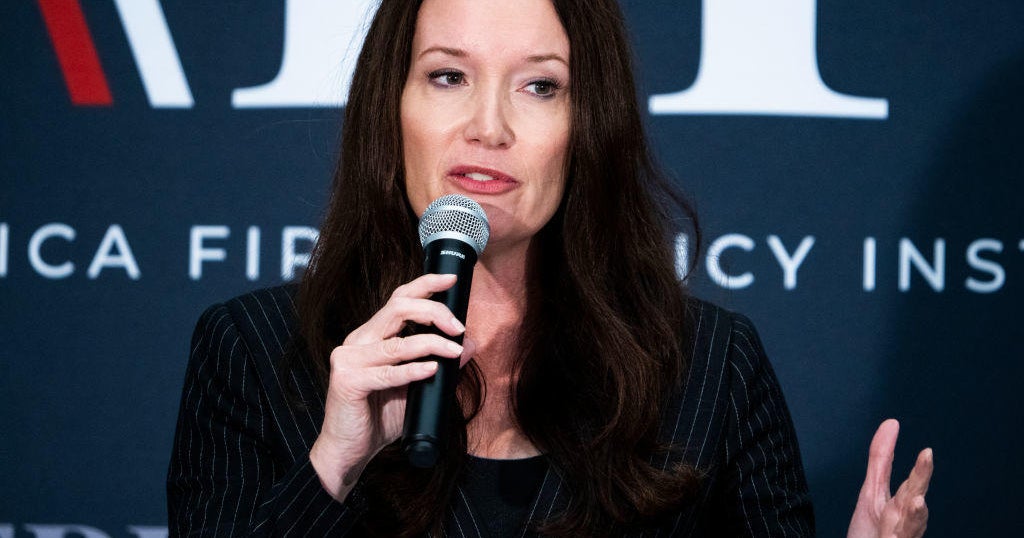
President-elect Donald Trump said Saturday that he will nominate former White House aide Brooke Rollins to be his agriculture secretary, the last of his picks to lead executive agencies and another choice from within his established circle of advisers and allies.
The nomination must be confirmed by the Senate, which will be controlled by Republicans when Trump takes office Jan. 20, 2025. Rollins would succeed Tom Vilsack, President Biden’s agriculture secretary who oversees the sprawling agency that controls policies, regulations and aid programs related to farming, forestry, ranching, food quality and nutrition.
Rollins, who graduated from Texas A&M University with a degree in agricultural development, is a longtime Trump associate who served as his former domestic policy chief. She is president and CEO of the America First Policy Institute, a group helping to lay the groundwork for a second Trump administration.
Tom Williams/CQ-Roll Call, Inc via Getty Images
Rollins, 52, previously served as an aide to former Texas Gov. Rick Perry and ran a think tank, the Texas Public Policy Foundation.
Rollins’ pick completes Trump’s selection of the heads of executive branch departments, just two and a half weeks after the former president won the White House once again. Several other picks that are traditionally Cabinet-level remain, including U.S. Trade Representative and head of the Small Business Administration.
Trump didn’t offer many specifics about his agriculture policies during the campaign, but farmers could be affected if he carries out his pledge to impose widespread tariffs. During the first Trump administration, countries like China responded to Trump’s tariffs by imposing retaliatory tariffs on U.S. exports like the corn and soybeans routinely sold overseas. Trump countered by offering massive multibillion-dollar aid to farmers to help them weather the trade war.
President Abraham Lincoln founded the USDA in 1862, when about half of all Americans lived on farms. The USDA oversees multiple support programs for farmers; animal and plant health; and the safety of meat, poultry and eggs that anchor the nation’s food supply. Its federal nutrition programs provide food to low-income people, pregnant women and young children. And the agency sets standards for school meals.
Robert F. Kennedy Jr., Trump’s nominee to lead the Department of Health and Human Services, has vowed to strip ultraprocessed foods from school lunches and to stop allowing Supplemental Nutrition Assistance Program beneficiaries from using food stamps to buy soda, candy or other so-called junk foods. But it would be the USDA, not HHS, that would be responsible for enacting those changes.
In addition, HHS and USDA will work together to finalize the 2025-2030 edition of the Dietary Guidelines for Americans. They are due late next year, with guidance for healthy diets and standards for federal nutrition programs.


